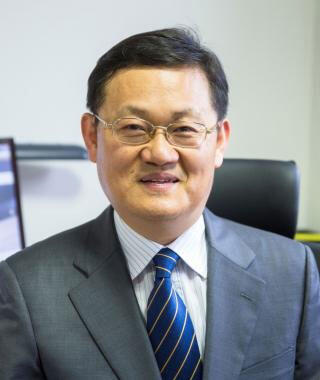
Q&A: Jong-Wha Lee on Coronavirus and Markets, Responding to Financial Crises, and More

Jong-Wha Lee is a professor of economics at Korea University and, for spring 2020, a visiting professor at SIPA. During 2007-2010 Lee was chief economist and director general of the economics and research department at the Asian Development Bank. He also served during 2011-2013 as a senior adviser for international economic affairs to the former president of the Republic of Korea.
Lee has taught at Australian National University, Harvard University, and Peking University and served as a consultant to the Inter-American Development Bank, the International Monetary Fund, the United Nations Development Programme, and the World Bank. He has written and published extensively on topics relating to human capital, growth, financial crises, and economic integration in leading academic journals.
In a recent email interview with SIPA News, Lee answered questions about coronavirus and its effect on world markets, responding to financial crises, and more.
Concerns about coronavirus are hitting markets around the world. As an expert on topics including both economic growth and financial crises, what do you foresee for Asia and for the world? Does Asia face different concerns than other regions?
I had previously conducted some research on the economic impacts of SARS [Severe Acute Respiratory Syndrome], using the methodology that we apply to analyze the impacts of the financial crisis on individual economies of the world. While it can take lives, an infectious disease is also like a financial crisis in that it causes significant negative shocks to an economy as people’s fear hurts consumption and investment, and also in that it is transmitted globally through trade and financial linkages.
One example is SARS, which started in China’s Guangdong province in November 2002, killed 349 people in mainland China and 299 in Hong Kong, and ultimately spread to 26 countries. The economic impacts were not big and were largely concentrated in China. Once the unexpected short-term event vanished, consumption and investment bounced back, and, consequently, the economy recovered. The Chinese government took measures, including fiscal and monetary expansion, that helped accelerate the economic recovery.
The new coronavirus (COVID-19) will have a much bigger impact on the global economy, in part because China’s share in the world output is much bigger, and the global economy now is more interconnected than it was 17 years ago. While this latest coronavirus outbreak is still unfolding globally, the already fragile global growth momentum has been further weakened.
Protecting public health against coronavirus must come first, but safeguarding the economy is equally important, so governments and central banks should prepare and install a set of economic policies to restore people’s confidence. In the wake of a major global crisis—whether a financial crisis or a pandemic—the United States must join with other major countries and international organizations to implement coordinated actions to revive the world economy, as they did to overcome the global financial crisis in 2008-2009.
The Asia Development Bank (ADB), where you previously served, is a key player in the region and has released about $4 million to date to help combat the virus in the Asia-Pacific region. What role do institutions like ADB play in a crisis like the current one?
The ADB is, though smaller in size, much like the World Bank. It has 68 members—49 from the region and 19 from outside Asia, including the United States and many European countries. ADB serves as a regional development partner that supports projects in its developing member countries that are designed to make people’s lives better. Its key priority is infrastructure investment, but it also supports social sectors including education, health, and social protection.
During times of crisis, like the Asian financial crisis in 1997 and the global financial crisis in 2008-2009, the ADB supported crisis-hit countries with financial support and policy advice. I understand that the ADB’s new funding this time will also provide support for member countries to improve monitoring of outbreaks, strengthen health systems’ resilience, and expand capacity to respond to an epidemic.
I took leave from Korea University and worked at ADB as a chief economist and director general of the research department for four years (2007 – 2010) when the global financial crisis spread to Asia. I traveled to Asia to discuss how the Asian economies should respond to the crisis. It was a great experience learning more about Asian economies and collaborating closely with their governments, media, and other stakeholders to design effective policies in the crisis time.
Have you enjoyed your time at SIPA and in New York City so far? What are the benefits of visiting another institution for a semester?
I teach Economic Growth in Asia, which analyzes growth experiences of major Asian economies and current structural problems and policy challenges including population aging, inequality, global trade protectionism, and technological changes. I have enjoyed teaching and having class discussions with a group of excellent students having diverse backgrounds. I hope to share my experiences at many international organizations and the Korean government that can help students obtain not just economic theories and tools but practical knowledge in dealing with various economic issues and current policy challenges facing Asian economies.
In my previous sabbatical year, I taught two courses on international finance and Asian economy at Harvard University’s economics department and the Harvard Kennedy School. I’m grateful to SIPA for inviting me and giving me this great opportunity to enjoy the intellectual and diverse environment of Columbia University and explore the great New York City. I really hope the world can contain the coronavirus outbreak soon so that we can go back to normal life.
This interview has been edited for clarity.